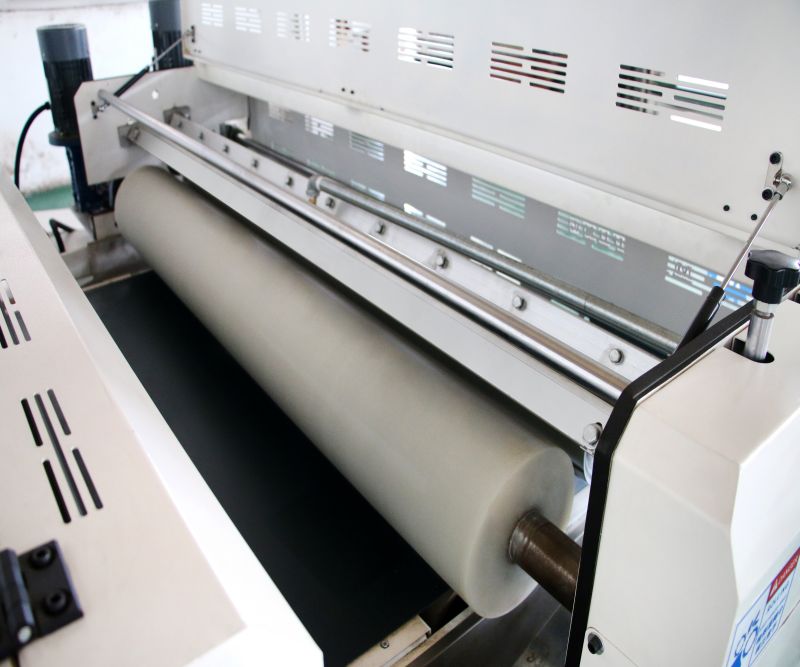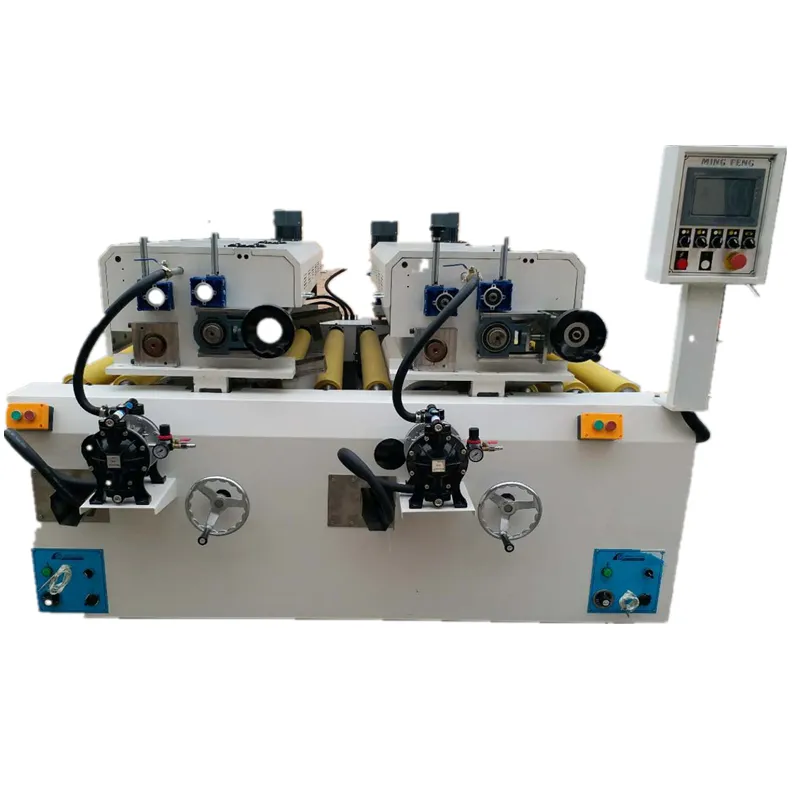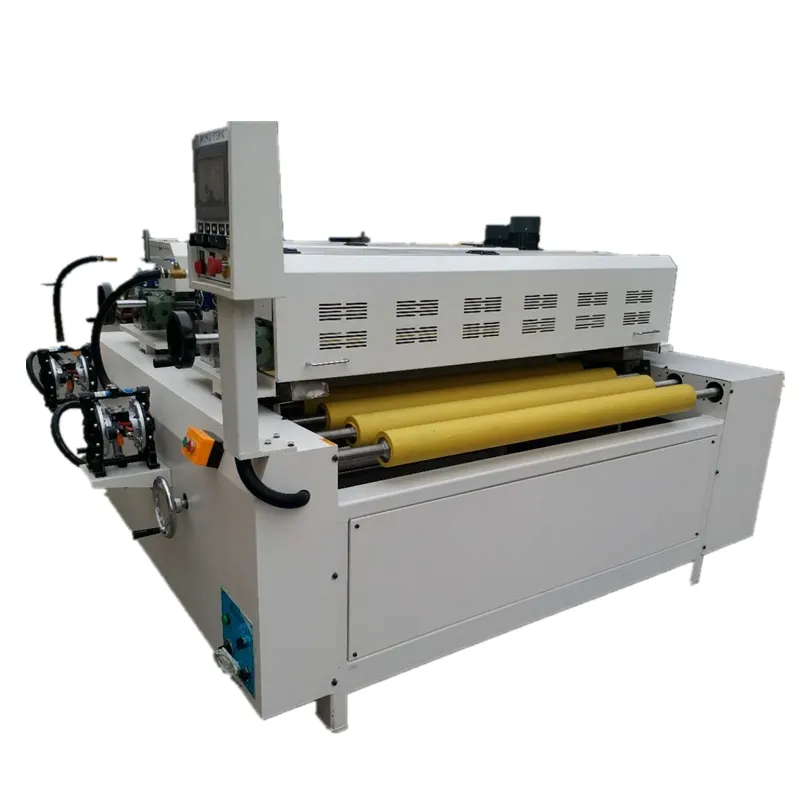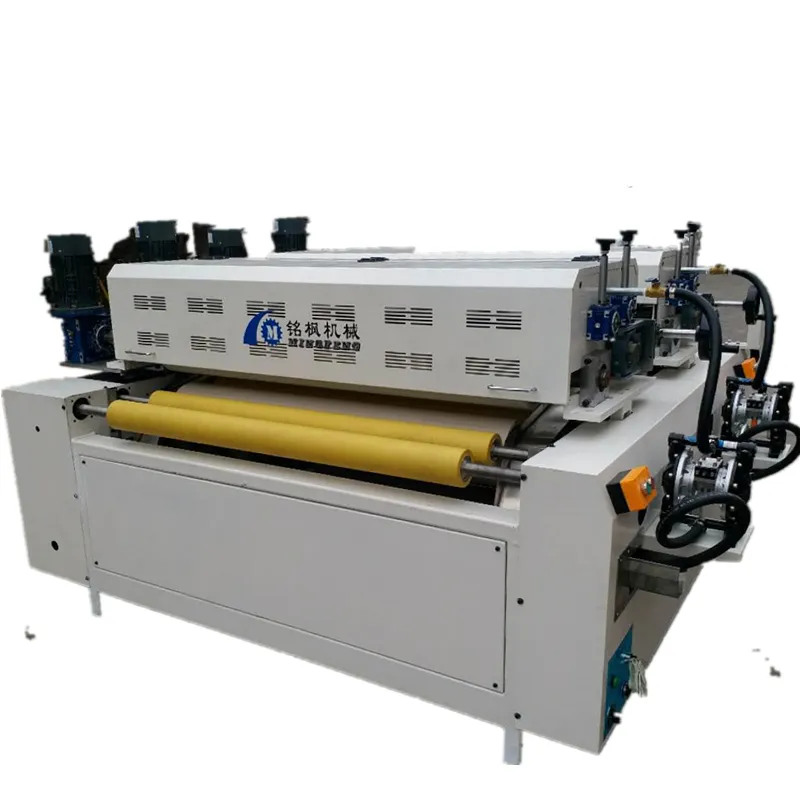In modern industrial manufacturing and surface treatment processes, roller coating machines are extremely important coating equipment. Using a precise roller mechanism, they evenly apply paint to a variety of flat substrates, achieving a smooth, uniform, color-free, and bubble-free decorative or functional coating.
This equipment is widely used in industries such as woodworking, furniture manufacturing, building decoration materials, plastic products, and metal products. So, what materials can roller coating machines coat?
This article will begin with the operating principles of roller coating machines and systematically explain their applicable materials, taking into account the surface properties, coating r equirements, and mechanical compatibility of different materials. This will help readers fully understand the application boundaries and capabilities of roller coating machines.

What is the operating principle of a roller coating machine?
A roller coating machine is an automated device that transfers paint through contact between a roller and the workpiece surface. It is typically equipped with a feed roller (or coating roller), a metering roller, and a pressure roller. Some high-end machines also feature precision control mechanisms to achieve micron-level coating control.
The basic principles are as follows:
• The feeding system delivers the paint to the coating roller surface;
• The metering roller controls the coating thickness by setting a set gap;
• The coating roller contacts the substrate surface, applying the paint evenly to the material;
• The conveyor system transports the workpiece at a constant speed, ensuring a uniform and ripple-free coating;
• The roller works in conjunction with a post-drying system (such as UV curing) to achieve film formation.
Roller coating machines are highly adaptable to various coating types and can be used with solvent-based, water-based, UV-based, and oil-based coatings. They are suitable for efficient batch processing of flat workpieces.

What materials can roller coating machines coat?
Materials that can be coated with roller coating machines:
1. Wood (MDF, particleboard, plywood, etc.)
2. Plastic substrates (PVC, ABS, PET, PS, etc.)
3. Metal surfaces (aluminum, stainless steel, iron, etc.)
4. Glass substrates (flat glass, tempered glass)
5. Ceramics and tiles
6. Man-made composite materials (UV panels, melamine panels, honeycomb panels)
1. Wood (MDF, particleboard, plywood, etc.)
Wood panels are one of the most common applications for roller coating machines. MDF (medium-density fiberboard), HDF, particleboard, and multi-layer solid wood panels are particularly popular in furniture manufacturing, flooring, and door and window assembly.
Suitability Analysis:
• High surface flatness, suitable for continuous roller coating;
• Compatible with a variety of coatings, including PU, NC, and UV coatings;
• Capable of multiple application processes, including primer, topcoat, and sealer;
• Uniform color and consistent surface gloss
Coating Advantages:
• Full film formation, preventing sagging;
• Strong adhesion, high hardness, and high scratch resistance;
• Achieve various finishes, including glossy, matte, and mirror finishes.
2. Plastic Substrates (PVC, ABS, PET, PS, etc.)
Plastic materials are widely used in modern home furnishings, construction, and electronics. Roller coating machines are well-suited for flat plastic sheets, decorative films, and wall panels.
Suitability Analysis:
• Thin and lightweight materials require low-pressure roller coating to prevent deformation;
• Surface pre-treatment (such as corona treatment) can be used to improve adhesion;
• UV coatings are typically used for fast curing.
Coating Advantages:
• Uniform and fine coating;
• Excellent color stability;
• Functional coatings (such as UV and scratch-resistant coatings) can be applied.
3. Metal Surfaces (Aluminum, Stainless Steel, Iron, etc.)
Metal substrates, especially aluminum, stainless steel decorative panels, and metal ceilings, are widely used in the construction and home appliance industries. Roller coating machines can precisely control coating thickness, making them an ideal means of achieving corrosion and rust protection, as well as aesthetically pleasing metal decoration.
Suitability Analysis:
• High metal surface hardness allows for stable roller coating;
• Primer is often required to enhance adhesion;
• High surface finish, suitable for high-gloss coatings.
Coating Advantages:
• Uniform, particle-free coating, suitable for large-scale production;
• A wide variety of colors is possible;
• Significantly improved corrosion resistance.
4. Glass Substrates (Flat Glass, Tempered Glass)
In the glass processing industry, roller coating machines are often used as an alternative to glass spray painting, particularly in furniture, bathroom, and display glass.
Suitability Analysis:
• Completely flat surfaces, suitable for roller coating;
• High-adhesion UV coating is required;
• Preheating or surface activation treatment is often required.
Coating Advantages:
• Minimal color shift;
• Uniform film adhesion and strong coverage;
• Can be combined with printing or patterning.
5. Ceramics and Tile Materials
Roller coating machines are becoming increasingly popular for coating decorative ceramic tiles, particularly for background walls, antique tiles, and polished tiles, replacing traditional spray coating methods.
Suitability Analysis:
• Hard material, suitable for high-pressure roller coating;
• Compatible with high-temperature-resistant coatings or inorganic coatings;
• Capable of treating irregular edges, but primarily flat surfaces.
Coating Advantages:
• Smooth and consistent surface;
• Scratch- and stain-resistant coating;
• More uniform overall decorative effect.
6. Man-made composite materials (UV panels, melamine panels, honeycomb panels)
Most of these materials already have a coating or special structure on their surface, but they can still be coated using a roller coating machine to enhance texture, provide protection, or improve visual effects.
Suitability Analysis:
• Relatively smooth surface, allowing for good roller coating uniformity;
• Generally suitable for light coatings or functional coatings (such as anti-fouling and anti-fingerprint coatings);
• Roller pressure and speed can be adjusted based on the material.

Compatibility of roller coating machines with different material coating requirements
Material Type | Suitability | Recommended coatings | Coating thickness control | Finish |
| MDF Board | ★★★★★ | PU/UV/water-based | High-precision control | Full, smooth paint film |
| PVC Plastic | ★★★★☆ | UV coatings | Fine thin coating | Strong adhesion, no blistering |
| Aluminum/Metal Sheet | ★★★★★ | Anti-corrosion paint/UV paint | Micron-adjustable | High gloss, high adhesion |
Glass | ★★★★☆ | UV paint | Uniform coating | No particles, transparent color |
| Ceramic Tile | ★★★★☆ | Ceramic coating/UV | Medium-thick coating possible | High decorative effect, scratch resistance |
| Melamine Board | ★★★★☆ | Surface sealant/anti-fingerprint coating | Light coating type | Smooth, no sticking |

The roller coating process optimizes material quality
In addition to adapting to a wide range of materials, the roller coating machine's process characteristics directly optimize the final material appearance:
1. Uniformity: Precision metering control ensures consistent coating thickness, avoiding defects such as "clouding" and "wavy" during spraying;
2. Improved adhesion: Suitable for multi-layer composite coating of primer and topcoat;
3. Environmental friendliness: The roller coating process produces virtually no spray spillage, with a material utilization rate exceeding 95%;
4. High efficiency: Continuous operation supports high-volume industrial production;
5. Cost savings: The coating amount can be adjusted according to substrate characteristics, reducing material waste;
6. Adaptability to a variety of finishes: Surface styles ranging from glossy to matte, embossed, and mirrored can be achieved.
What technical support does XMF Machinery provide for purchasing coating machines?
We offer full technical assistance before and after purchase, including machine selection advice, installation support, training on operation and maintenance, and quick troubleshooting. Our professional team ensures customers receive the right machine at the best price, backed by reliable service and expert guidance throughout the purchasing process.
